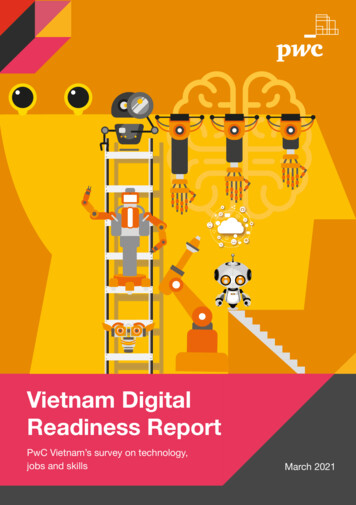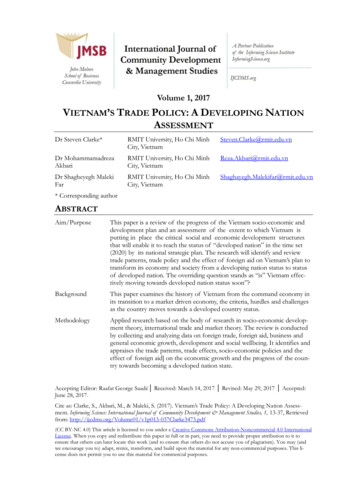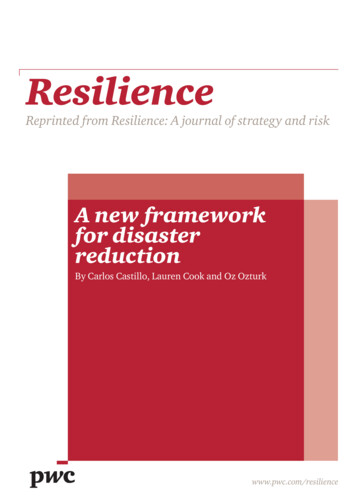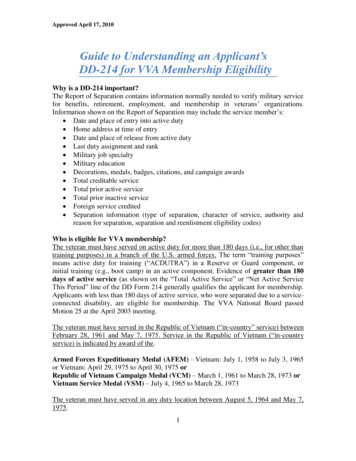
Transcription
Vietnam DigitalReadiness ReportPwC Vietnam’s survey on technology,jobs and skillsMarch 20211
2lDigital Readiness Report
ForewordOur world today is facing a skills crisis. In recent years, we have seentechnology develop at breakneck speed, resulting in a shortage ofqualified talent for jobs created by the new digital economy.The rise of automation is also changingthe way current tasks are carried out,and putting jobs in various industriesat risk. Together, these two trendshave broadened the skills gap betweentoday’s employees and the workforceof the future.The COVID-19 pandemic hasaccelerated changes in how andwhere we work. While the future isunpredictable, it is worthwhile to lookahead now to prepare for a changedfuture. Because resilient futures dependon technology adoption and new skills.Do Vietnamese people feel they areequipped with the relevant skillsneeded to help them work alongsidetechnology? We sought to find outthrough a survey that was releasedto the Vietnamese public from 12November 2020 to 27 December 2020.Our survey brought in a total of 1146responses. The key findings as voicedby our respondents are reflected here.This report explores how readyVietnamese people see themselves inthe age of technology.Dinh Thi Quynh VanGeneral DirectorPwC Vietnam3
Table of contents4lDigital Readiness Report
Background06 Vietnam’s digital readiness journey07 Vietnam has significant opportunities to furtheraccelerate digital readiness09 Making the most of Vietnam’s digital agenda10Key Findings11Summary of our findings121The sentiment - What do Vietnamese people thinkabout technology?132The impact - How will technology change work?173The response - What will Vietnamese people do inresponse to the digital transformation?214The support - How should Vietnamese people besupported?24What’s next?3082Appendices38 About the survey39 PwC’s ‘New world. New skills.’ programme405
BackgroundDigital readinessDigital readiness is defined by the level of human capital development that is needed to builda workforce capable of utilising and creating technology on a continuous basis .116Cisco Global Digital Readiness Index 2019lDigital Readiness Report
Vietnam’s digital readiness journeyWhile Vietnam has made important progress in 2020, more workneeds to be done to address the digital skills development gap.This is to ensure that in pursuit of the nation’s digital economyachievements, no one will be left behind.According to the 2020 Global Innovation Index (GII), Vietnam maintained its 42ndposition for the second year in a row. While the overall ranking remained thesame, compared with 2019, GII also observed that Vietnam improved in businesssophistication (rank 39th) but declined in human capital and research (rank 79th), andknowledge and technology outputs (rank 37th).Ranking in2020Country comparison in South East AsiaSGMYTHIDPHVNVN(2019)GII(out of 131countries)8th33rd44th85th50th42nd42ndGTCI(out of 132countries)3rd26th67th65th46th96th92nd23Although Vietnam has emphasised a focus on Industry 4.0 policy reforms, in terms ofworkforce digital skills, the nation dropped four spots to rank 96th in the 2020 GlobalTalent Competitiveness Index (GTCI)23Global Innovation Index (GII) 2020Global Talent Competitiveness Index (GTCI) 20207
Vietnam’s digital readiness journey (cont’d)What does the disparatetakeaway mean?There is no “one-size-fits-all” approach.The skills and competency of the workforcerequires constant improvement as thecountry forges ahead into the new digitalworld. Adding to this upskilling or reskillingcomplexity is the fact that different skills(Advanced technical skills, “soft skills” orgeneralised computer literacy) are neededon multiple levels in order to account forindividuals in various life stages.A lack of clarity among the workforceabout the skills required to succeed canalso delay the nation’s digital integrationwith Industry 4.0. According to an earlierPwC report , only 14% of the respondentsbelieved that they and their employees hada clear view of the skills required for digitaltransformation.448PwC Vietnam - Industry 4.0 Vietnam Survey 2018lDigital Readiness Report84%of Vietnameserespondents indicateda need for a skillsframework to guideIndustry 4.0 capability4development
Vietnam has significant opportunities to furtheraccelerate digital readinessVietnam has made great strides in pushing the Industry 4.0 agenda forward. Amid thedisruptive changes to technology, how the nation prepares its workforce now to preventthem from being left behind is crucial.Below are some key 2019-2020 initiativesproposed to push forward the digitaltransformation agenda in the country: Resolution No. 52-NQ/TW,published in 2019 sets out guidelinesand policies in Vietnam’s pursuitof and participation in the FourthIndustrial Revolution National E-government portalto centralise and streamline publicfacing services was rolled out in late2019 Ministry of Information andCommunication - NationalProgramme for digitaltransformation by 2025 targetingsectors such as agriculture,education, finance and logistics5 Ministry of Science andTechnology and Ministry ofEducation and Training - NationalProgramme 844 and 1665 tohelp the development of digitaland technological startups Decision No. 127 / QD-TTg ofthe Prime Minister: Promulgatingthe National Strategy onArtificial Intelligence Research,Development and Applicationby 2030 Ministry of Planning andInvestment - Proposed NationalStrategy for the FourthIndustrial Revolution draft5Vietnam Investment Review - A Vietnamese perspective on the evolution of Industry 4.0, June 20209
Making the most of Vietnam’sdigital agendaDespite the ongoing health and economic challenges, COVID-19 also drove the adoptionof multiple digital initiatives. Now is the time to accelerate Vietnam’s digital and technologytransformation agenda.Vietnam’s on-going regulatory focuson digital transformation has helpedthe nation navigate this health crisisthrough its timely and evidence-basedresponse. At its peak, local authoritiesused different digital tools (textmessages, websites, social media)to send alert notifications. This actionnot only raised public awarenessabout the pandemic, but also resultedin a significant rise in online publicservices.What is clear is that the COVID-19pandemic has caused a permanentand significant adoption spurt inVietnam. To illustrate, The NationalE-government portal, which wasrolled out in late 2019, saw a surge67810World Bank - Can COVID-19 catalyze Vietnam’s digital transformation?, April 2020e-Conomy SEA 2020 ReportWorld Bank - COVID-19 Policy Response Notes for Vietnam, June 2020lDigital Readiness Reportin traffic in 2020 , with 11 million visitsin late January and over 28 million atthe end of March, during the heightof COVID-19 outbreak in Vietnam Inaddition, Vietnam’s Internet economy isthe fastest growing in SEA in 2020 andwill have an estimated value of US 52billion by 2025 .67In order to achieve the nation’s goalto become a high-income economyin the future, Vietnam should hastenthe country’s digital and technologytransformation agenda. The WorldBank, in its recent COVID-19 policyresponse report noted that there is anopportunity to expand Vietnam’s digitalagenda by encouraging priority reformsto promote e-learning, e-payments, ande-governments. And we agree with this.8
Key findings11
Summary of our findingsThe SentimentWhat doVietnamesepeoplethink abouttechnology?Amid optimism lie concerns around job security - While89% of respondents believe automation brings moreopportunities than risks, 45% also expressed concerns aboutautomation putting jobs at risk.ExcitedScaredThe ImpactHow willtechnologychangework?The ImpactThere is general agreement that technology is changingjobs - 90% believe that technology will change their currentjobs in the medium term (6-10 years), while 83% believe theywill feel the impact in the short term (3-5 years).Low impactHigh impactThe ResponseWhat willVietnamesepeople do inresponse tothe digitaltransformation?The desire to be digitally savvy is strong - 84% ofrespondents say that they would learn new skills now orcompletely retrain in order to improve future employability.No desireStrong desireThe SupportHow shouldVietnamesepeople besupported?Because digital skills are key to improving job prospects,55% said it is the responsibility of individuals to reskill.However, businesses and governments can playimportant roles in addressing the upskilling gap.Others’ responsibilities12lDigital Readiness ReportMy responsibility
The sentimentWhat do Vietnamese people think about technology?Our survey findings reflectan accelerated presence andinfluence of technology in theworkplace and the changes tocome. Enabling both workersand firms to adapt in the newtechnological environmentand empower them to achieveoutcomes will be key.Grant DennisChairman, PwC Vietnam13
The sentiment: What do Vietnamese people think about technology?1Technology offers more opportunitiesthan risks: Vietnamese peopleare more optimistic than theirglobal counterpartsThis finding comes as no surprise 85% of respondents said that it presents moreopportunities than risks. This level of optimism is higher than the global average of 50%.A key feature of automation, for example, is its ability to perform manual and routine tasksautomatically. This, in turn, frees up time for employees to focus their attention on moreinteresting challenges.89% ofrespondents saidthat they had positivefeelings about therole of technology intheir jobs. Globally, amajority (61%) werepositive about theimpact of technology.Q: When you think about the future impact of technology onyour job, which of the following best describes how you ed45%26%16%11%4%7%0%Vietnam14lDigital Readiness ReportGlobal2%
The sentiment: What do Vietnamese people think about technology?2Vietnamese people believe thattechnology will benefit theirfuture careersThe level of confidence highlights the importance of digital skills as workers who are equippedwith the right skills will be able to effectively make the most out of the current and futuretechnological advances. This finding confirms what we have long known to be true: digitalskills are key. To prepare Vietnamese people for the digital future, the government recentlyissued the National Plan for Digital Transformation by 2025 which highlighted tasks needed tofurther strengthen Vietnam’s workforce.990% ofour respondentsoverwhelmingly thinkthat technologicaldevelopments willimprove their jobprospects in thefuture. This level ofoptimism is higherthan the global level(60%).Q: Do you think that technological developments willimprove or impede your job prospects in the future?SignificantlySlightlyIt will makeSlightlySignificantlyimproveimproveno nam92%GlobalNational digital transformation program to 2025, orientation to 203015
The sentiment: What do Vietnamese people think about technology?3Despite the optimism, there areconcerns around job securityUnderlying our local respondents’ positive sentiments is a sense of uncertainty. Manyare still concerned about how automation will affect job security.According to an earlier PwC study analysing the potential long-term impact ofautomation globally, the proportion of existing jobs that might be at high risk ofautomation will differ based on three factors:10 Industry sectors;Occupations within those industries;Workers of different ages, gender and education levelsQ: How much do you agree or disagree withthe following statement: “I am worried thatautomation is putting jobs at risk.”45%45% of respondentsare worried that automationwill put jobs at risk.30%25%AgreeNeutralDisagree1016PwC - How will automation impact jobs?, 2018lDigital Readiness Report
The impactHow will technology change work?Digital disruption is alreadyhappening - there is predictionthat by 2025, half of all worktasks will be handled bymachinesVo Tan LongChief Digital Officer, PwC Vietnam17
The impact: How will technology change work?1Undoubtedly, technology ischanging the job landscapein the next 6-10 yearsGlobally, PwC’s own analysis predicts that 30% of jobs are at risk ofautomation by the mid-2030s. This reflects the potential impact thatautomation and new technologies will bring and the need to meet thecoming requirements of the new jobs and opportunities.1090% respondents agreed thattheir jobs will change in the next6-10 yearsQ: Do you think technology will change yourcurrent job?DefinitelyProbably63%83%Whilebelieved that it willhappen sooner i.e. in 3-5 wC - How will automation impact jobs?, 2018lDigital Readiness Report3 - 5 years6 - 10 years2%
The impact: How will technology change work?2Jobs themselves will bedifferent from todayWhile our local respondents believenew technology and automation willchange the job landscape, the extent ofthe change will differ.45% believed thattechnology will make someslight improvements but nosignificant changes.Q: “Thinking about somebody doing the job youhave now but in 10 years’ time, how do you thinkit will change?5% Exactly the same as today12% Mostly the same as today45% Slightly different to today38% said the job willbe very different (i.e. manyparts of the job will be doneautomatically or the job mightnot exist in 10 years’ time)30% Mostly different to today8% Completely different to today19
The impact: How will technology change work?3Technology willimprove productivityTop reasons for this optimism are: Technology will allow me to domore interesting work (35%) Technology will enable me toget more work done ( 25%) Technology will find solutionsto problems (20%)Q: Do you think technology will change your day-to-day work for the better (e.g. willmake me more efficient) or worse (e.g. make my job more complicated)?61% Much better36% Slightly better1% Slightly worse1% Much worse20lDigital Readiness Report97%of respondents saidthat technology would improvetheir work efficiency.
The responseWhat will Vietnamese people do in response todigital transformation?In order to realise the digitaltransformation potential andaddress the concerns of workersand employers, the automationprocess will need to come handin hand with training, upskillingand reskilling of the workforceChristopher Lee (Aik Sern)Senior Manager,Consulting Services - Workforce Transformation21
The response: What will Vietnamese people do in response to digital transformation?1There is strongdemand for learningWith a strong appetite for learning among our local respondents, there is an opportunityfor businesses to play a role. Organisations should develop, or if needed, reexamine theirupskilling and reskilling programmes to meet these needs.84% would learn new skills now orcompletely re-train in order to improvefuture employability, as compared to theresponses at global level (77%).Q: To what extent do you agree ordisagree with the following statement:“I am ready to learn new skills now orcompletely re-train in order to improvemy future employability”93%are currently learningnew skills, with the majority of theserespondents saying that they are learningindependently.Q: Are you learning new skills to betterunderstand or use technology - eitherthrough your employer or independently?Select all that apply.49%Strongly agreeDisagree22l35%28%12%36%2%29%2%7%AgreeStrongly disagreeDigital Readiness ReportIndifferentYes, Through my employerYes, IndependentlyBothNo
The response: What will Vietnamese people do in response to digital transformation?Proficiency in learning andadapting to new technologiesis in high demand243%want to become more proficient atlearning and adapting to new technologiesQ: What type of workplace skills would you mostlike to develop?To becomemore proficientat learningand adaptingto newtechnologies,whatever theymay beTo becomeproficient ina specifictechnologyTo improvegeneralbusiness skillsTo improvesoft skills43%34%28%28%20%16%12%VietnamGlobal11%34% would liketo develop specialisedexpertise in specifictechnologies.These results, whichare much higher thanthe global responses,reflect the strong desirefor Vietnamese to stayrelevant in the comingdigital age. It is worthnoting that although thedesire for non-digital skillsets (i.e. business skillsand soft skills) are lowerthan global, these is stillimportant skills. In timesof uncertainty, skills likeagility, problem solvingand leadership, to name afew,will help Vietnamesepeople face challengeshead-on.23
The supportHow should Vietnamese people be supported?Business leaders, governmentsand educational institutions- must work together toupskill our people to meet theworkforce needs of the futureand drive sustainable economicgrowth for VietnamDinh Thi Quynh VanGeneral Director, PwC Vietnam24lDigital Readiness Report
The support: How should Vietnamese people be supported?1Businesses and governments canplay important roles in addressingthe upskilling gapDespite a strong desire for learning amongstthe respondents, what is clear is that askills framework is also needed. This wasreflected in our 2018 Vietnam Industry 4.0survey where 84% of respondents indicated55%A majority of respondents(55%) said that it’sthe responsibility ofindividuals for re-skilling33%A third (33%) say thatit’s the responsibility ofbusinesses.9%33%55%they need guidance on Industry 4.0capability development.We expect the skills andcompetencies will constantly evolveas a result of the disruptive changesof technologies. The labour forceneeds to update and improvethemselves continuously or risk beingleft behind or laid off as robots takeover some jobs. Thus we believeboth businesses and the governmenthave important roles to play inensuring the workforce have accessto inclusive programmes.Q: Of the following organisations, whodo you think is most responsible forhelping people to upskill?3%GovernmentsBusinessesIndividualsOthers25
The support: How should Vietnamese people be supported?2Organisations are doing their partto meet the upskilling needs of theirworkers.88%of our respondents saidthat they are providedopportunities to improvetheir digital skills.Q: Is your current employer giving you theopportunity to improve your digital skills outsideyour normal duties?41%47%13%Yes – many opportunitiesYes - some opportunitiesNo opportunities at allNote: Not all figures add up to 100% asa result of rounding percentages.26lDigital Readiness Report
This shows that employers themselveshave an understanding of the needs oftheir workforce, but there are things tolook out for.The survey also revealed the top 3areas that will increase the likelihood ofemployee participation in skills training:i) if there is no extra time commitmentii) if it is specific to the roleiii) if it offers an opportunity toincrease earnings.73%said that they arewell-equipped in usingnew technologies inworkplace.Organisations should assess their currentand future business needs. This willhelp them identify the skills gaps andmismatches that may be present, andguide them in building or updating a skillsstrategy that closely aligns with theirbusiness goals. Investment into talentdevelopment will yield benefits.Q: How well equipped do you feelin using new technologies in yourworkplace?18%56%18%3%5%Very well equippedSomewhat well equippedNot particularly well equippedNot at all well equippedNot sure27
The support: How should Vietnamese people be supported?3Remote work will be inhigher demandAlthough Vietnam has been relatively isolated from the impact ofCOVID-19 compared to the rest of the world, remote work is stillan emerging trend that should be considered.82%believe that workingfrom home will becomemore prevalent, evenpost COVID-19.Q: Going forward, do you think thatworking from home will become morewidespread in your line of work postCOVID-19?82%18%Yes28lDigital Readiness ReportNo
The support: How should Vietnamese people be supported?4Technology and process arekey productivity enablers forremote workersThis shows that at an individual level, Vietnamese workers for the most part, are capableof adapting to the new remote working environment. Companies that make the shift willbe able to more seamlessly take advantage of the benefits of working from home.Our respondents, however, indicated three key factors that can limit the productivity ofworking from home: 35% the work process 31% the tools and technology and 17% the organisational culture54%of respondents said thatthey were productive whileworking from home.Q: How productive are you when havingto work from home?16%This, however, varied across agegroups, with younger generationsreporting higher productivity.Note: Not all figures add up to 100% asa result of rounding percentages.Very Productive38%ProductiveAverage34%8%Not very productive3%Can’t work from home29
What’s next?30lDigital Readiness Report
There is need for collaborations amonggovernments, institutions and businessesTechnology is onlyas good as theleaders who identifyits technologicalopportunities, thetechnologists whodeliver them and thepeople who work withthem every day.Our world today is facing a skillscrisis. Automation is threatening manyexisting jobs. At the same time, thereis a shortage of qualified talent for thenew digital economy. Together, thesetwo factors have widened the gapbetween the employees of the presentand the workforce of the future.Solutions to the challenge of upskillingwill need to be developed at the local,regional and national levels, and noone organisation can do this alone. Theneed to upskill is a complex problemthat will require decision-makers governments, educators, and businessleaders - to come together. Government leaders andpolicymakers need to ensure thatcitizens have the knowledge toparticipate, and they themselveshave the knowledge to drivediscussion on the future oftechnology and regulation.Institutions, such as those thatmake up the education system,need to transform themselvesdigitally and, at the same time,provide services that are fit for thefuture.31
Governments as a whole can also play a directrole through upskilling their own workforce –as a major employer.We suggest key actions for the government to consider when developing aframework for upskilling:Provide for fundamental needs,prioritising the vulnerable andthose in greatest needHelp people earn a decent livingand prepare them for the futureworld of workDesign and launch a nationalupskilling programme whichprioritises investments in industriesthat are most likely to be impactedby automation over the next fiveyears.While the responsibility to upskillthe workforce of the private sectorprimarily falls on employers andother business organisations,the government should considersupporting them by ensuring thattransitional funding is availableto help SMEs cover the costs oftraining, potentially subsidisingcosts for employers that wouldstruggle.The government should commit to anew target, seizing the opportunitypresented by automation to closethe skills gap among socio-economicgroups.Close the opportunity gap thatexists between placesThere should be programmeswhich aims to boost social mobilityby removing obstacles that could32lDigital Readiness Reportstop people from achieving theirpotential. These would be in regionsthat are most prone to beingnegatively impacted by automationand related changes.
Give individuals more controlover the services they accessGovernment and business shouldinvite the emerging govtech sectorto produce innovative ideas formaking it easier for individuals toaccess learning opportunities inways which suit them (online, mobilelearning, using AI to make it bespoketo the learner). In the NationalPlan for Digital Transformation, theVietnamese government has setout a target towards more platformbased and tailored training to meetthe specialised needs of differentpeopleEmpower communities to shapethe places in which they liveAll local officials should assessthe impact of automation in theplaces they are responsible forand develop local and regionalupskilling programmes.Theseprogrammes should be alignedwith local industrial strategies, andagreements between central andlocal government about devolution.Within the National Plan for DigitalTransformation the governmenthas set plans for training in varioussectors which will have regionalimplications, including for agricultureand organisations in industrial parksand export zones.33
Organisations should take steps to prepare theirworkforce for the digital worldWe suggest five steps for organisation leaders to consider:Identify skillsgaps andmismatchesAssess thecurrent andfuture needs,allocateresourcesand prioritisemismatches.1Build afutureproof skillsstrategyBuild strategicplans to dealwith the skillsgaps whichhave themost impacton deliveringbusiness value.Lay theculturalfoundationUse cultureas thebedrock of anorganisation’supskillingefforts. Createa cultural shiftand the rightbehaviours.Inspire citizenled innovation.Nurturephysical vitalityand mentalwellbeing.321134lDigital Readiness ReportDevelop andimplementupskillingCreate anddeployprogrammeswhichharness theorganisation’sculture and usekey behaviouraleconomicsprinciples todeliver theright learningexperience andrapid results.4Evaluatereturn oninvestmentMeasure thereturn oninvestment(ROI) fromupskillingprogrammes.Find out moreabout somemetrics to trackROI in thisreport11.5PwC - Fit to compete: Accelerating digital workforce transformation in financial services, 2019
As individuals, it’s important to have a clearview of what the future megatrends look like,the roles we play, the actions we should take.We believe that individuals should:Take actionPlan for an automatedworldUnderstand the bigpicturePay attention:Understand howtechnology is developingand what it and the othermegatrends could meanfor the world of work –and you specifically.Expect the unexpected:Use our four Worlds ofWork12 to consider howdifferent the world couldlook and plan for multiplescenarios and outcomes.12PwC - Workforce of the future, 2018Find the gaps: In anautomated world we willstill need human workers.Whether this is workingto develop technology,alongside it, or morespecifically; very specialisttypes of employment the places automationsimply can’t compete yet.Work out where you wantto be.Get your skills inorder: The skills neededfor the future are notjust about science andtechnology. Human skillslike creativity, leadershipand empathy will be indemand. Identify theskills you need and startfocusing on how tobuild them – and howto use them alongsidetechnology.Adapt to survive: Thehuman race is infinitelyadaptable but also riskaverse. Work out whatholds you back – whetherstructural and financial(loans, mortgages,responsibilities) oremotional. Work outwhat matters to you andyour family and plan forchange.Jump on a passingship: There is no onefuture-proof career, onlybetter options for you.Determine how to get tothe ‘next better thing’.35
Our responsibility to one another on selfupskilling begins at home, and extends to thecommunities where we live, work and play.Whether it’s self-aware robots, smart clothing, oran unhackable quantum internet, there are a lot ofcutting-edge inventions out there.Learn about the new privacy laws and how theyimpact youDiscover how innovation happens Find out how direct-to-consumer brands are makinge-commerce work and what companies need to do toearn trust.Tools for working remotelyEmerging technologyRoles of the future 36lDigital Readiness ReportsiBuLearn from industry leaders and experts abouthow business is changing and what you can doto stay ahead.iestiunCom mShare with friends and communities about whatthe future of technology holds for all of us:ness
Share real-world ideas to help you and yourfamily. Topics on how to manage stress andtalk with your children about challengingsubjects.Fami chersslieaTe Be inspired while learning about what’s newin the new digital world.Preparing for the future of workSeven virtual worlds that we’re alreadyexploringTechnology and today’s realities havechanged the way we teach and think aboutour learning spaces. Find out more about learning in the digital age.Understanding new technologies and theirimpact on learningApplying design thinking to problem solving37
Appendices38lDigital Readiness Report
About the Survey1%The survey was sent out tothe Vietnamese public from 12November 2020 to 27 December2020. Participants were asked toanswer a list of questions relating totechnology, jobs and skills.*35%42%1146 responses were collected.22%Note: Not all figures add up to 100% as a resultof rounding percentages.Gen XGen ZMillennial2%14%2%5%18%14%23%Baby Boomers5%Education18%Employment61%61%75%University graduateHigh-schoolPost-graduate/ ProfessionalTechnicalWorking full-timeStudentWorking part-timeUnemployed*This report was prepared independently by PwC Vietnam, and is our local version of PwC’s Global “Upskilling hopes and fears” report releasedin 2019 which surveyed over 22,000 adults across 11 countries: Australia, China, France, Germany, India, Netherlands, Poland, Singapore, SouthAfrica, the UK and the US.39
PwC’s ‘New world. Newskills.’ programme‘New world. New skills.’ is aglobal initiative by the PwCglobal network that aimsto help millions of peoplearound the world improvetheir understanding, skills andknowledge for the digital world.We believe that businesses,governments, educators andcitizens play important roles innarrowing the digital divide.At PwC Vietnam, we haveinvested in training to ensureour people are prepared forthe future of work. We arealso committed to doing ourpart in reaching underservedcommunities who may nothave access to upskillingopportunities, in order toensure no one gets left behind.There’s an urgent need fororganisations, govern
Vietnam. To illustrate, The National E-government portal, which was rolled out in late 2019, saw a surge in traffic in 20206, with 11 million visits in late January and over 28 million at the end of March, during the height of COVID-19 outbreak in Vietnam In addition, Vietnam's Internet economy is the fastest growing in SEA in 2020 and










